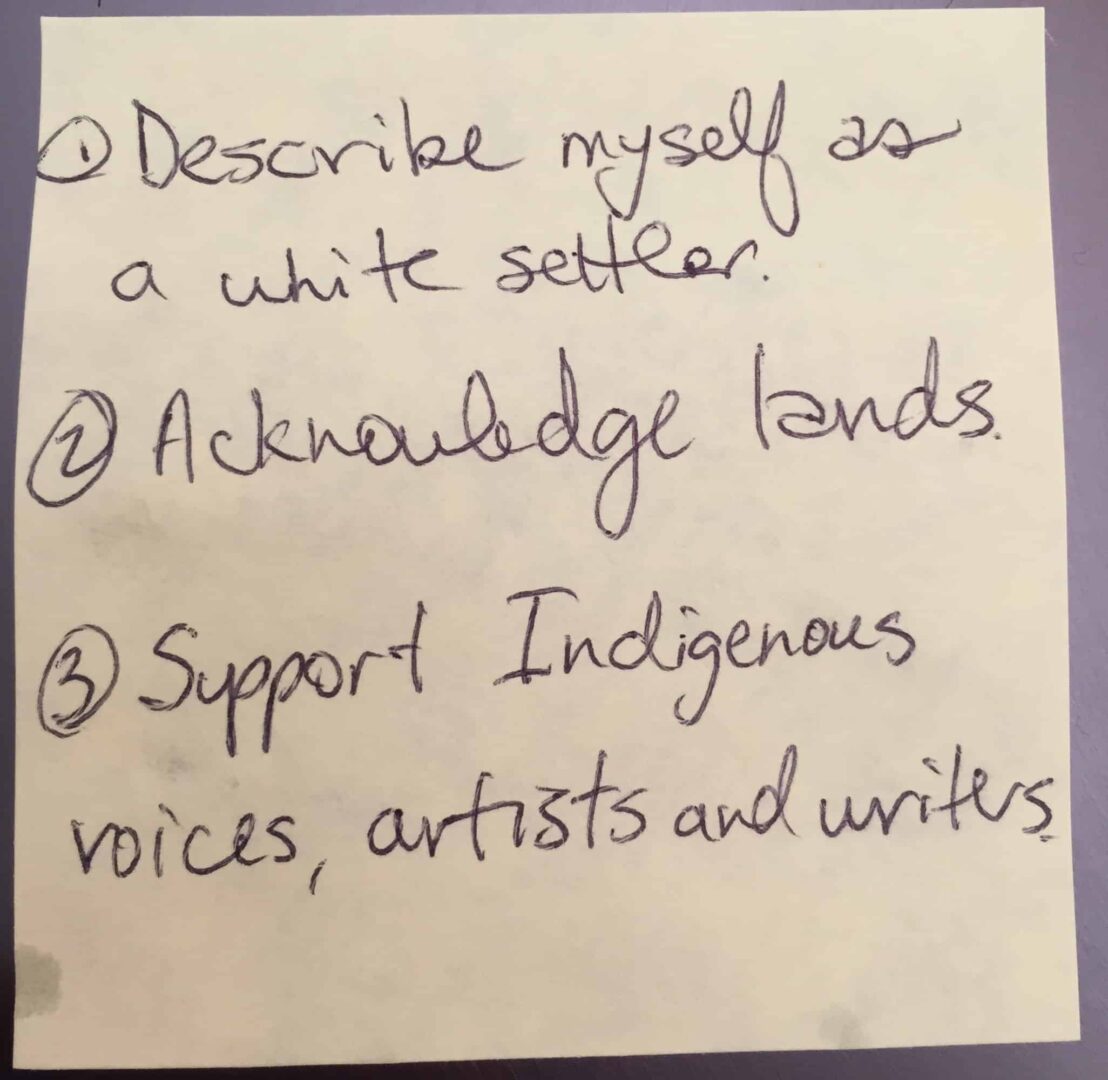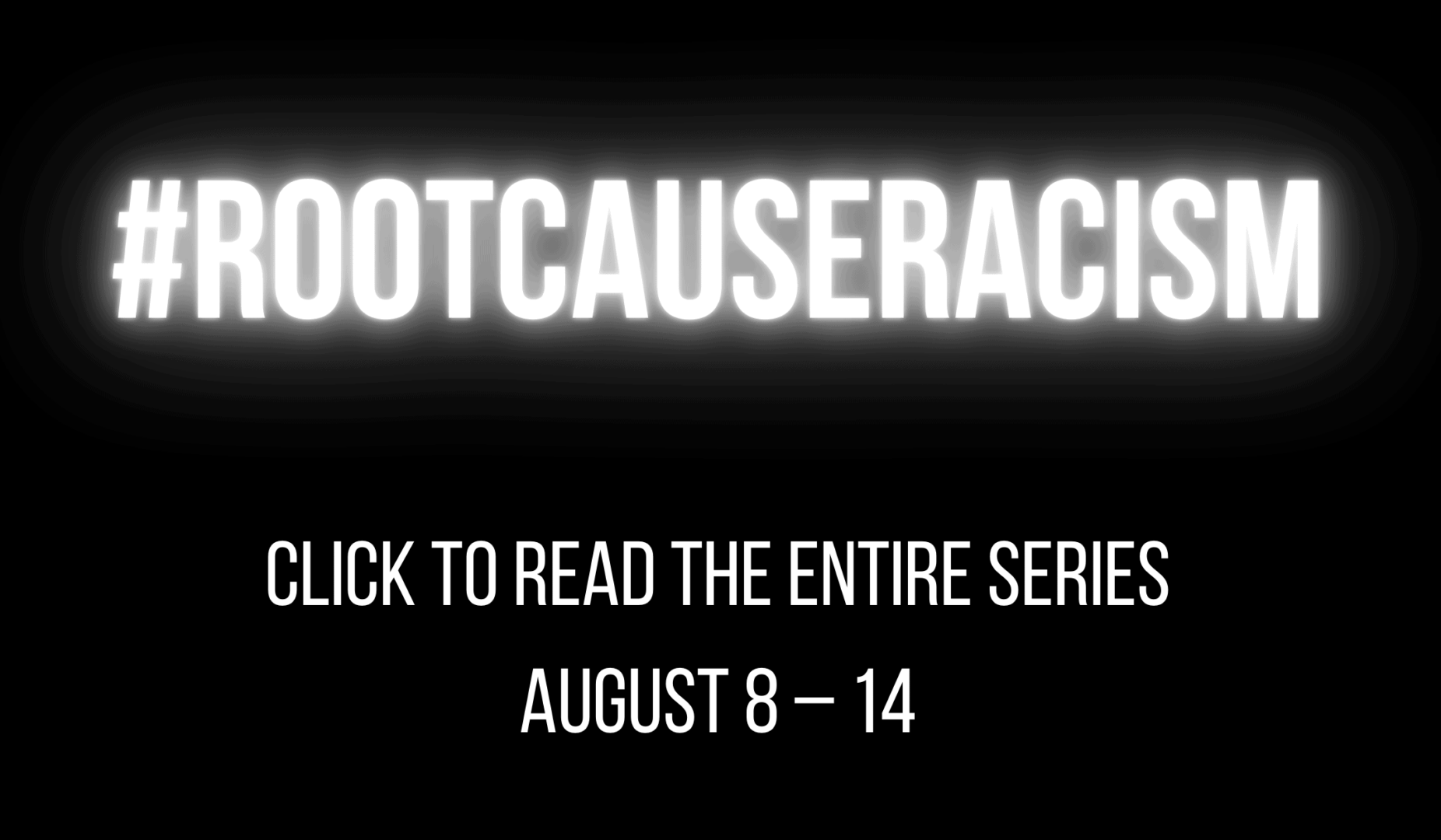
I've been carrying around my original Back Pocket Reconciliation Plan for years now. Mine is on a pastel yellow square Post-it note. There are three handwritten lines on it:
1) Describe myself as a “white settler”
2) Acknowledge lands
3) Support indigenous voices, artists and writers

That first one, describe myself as a white settler, changed my identity. The others have guided my actions and sometimes given me courage. These aspirations have helped me direct my time, attention, and money, and sent me out of my comfort zone.
I wrote this little plan when I heard Chief Robert Joseph, a Hereditary Chief of the Gwawaenuk First Nation, and an ambassador for Reconciliation Canada, suggest that if those of us whose ancestors were not of this land wanted to move forward in peace, we needed to make it personal and actionable.
I am a white Canadian woman. I know my privilege, my education, my prosperity all came from a system, a white supremist system, that tried to make “Indians” disappear.
My ancestors left Ireland and Italy at the invitation of a colonial government that deeded lands that were not theirs to give. I carry a white settler pedigree that includes prairie homestead farmers, folks who worked for The Hudson's Bay Company, and the Canadian Pacific Railway.
So, when the Truth and Reconciliation hearings came to Vancouver in 2013, I showed up to listen in person to the lived truth of indigenous women and men. What I heard was tragic and shattering and necessary. My education and upbringing had glossed over the ugly sides of our culture. I wrote my plan and I started for the first time to call myself a white settler.
I think maybe white folks aspiring to be anti-racist might find a back pocket plan useful, too.
In that spirit, I offer my first draft Back Pocket Anti-Racism plan.
- Call myself white and call others what they want to be called
On this one, I would send the questioning reader to White Fragility, where author Robin DiAngelo makes the point over and over that white Americans and Canadians don't like to be called “white.” It makes us uncomfortable. In not naming our race we maintain an understanding that whiteness is a norm.
As to calling others what they want to be called, for me this means for example, capital B Black, Latinx with an x, and extends to pronouns.
As a former English instructor, I bristled over the singular they / them for a while, but I listened and got over myself. My pronouns are she and her. It isn't hard to be open to new words if you are open.
- Acknowledge the past and learn to challenge the myths of my culture.
- Listen and hold space for BIOPOC (Black, Indigenous and People of Colour) colleagues, students, and strangers by refraining from sharing my every thought.
- Notice who isn't present and ask why. Speak up, especially to white people who ask for my complicit silence
This applies in personal interactions, like a racist comment from a white taxi driver, to public and civic injustices. Speak up.
- Get out of my bubble.
I have a diverse interracial family, but we experience little direct racism. Our bubble might be safe and comfortable, but it can lull us into denial.
My next action, after some reflection will be to integrate my reconciliation plan with my anti-racist plan.
What's your next step?
I would like to invite you to write your own short, personal anti-racism plan and keep it close. You can share it as a comment below, if you like.
Look at it often.
I believe we can all try to live up to our higher ideals every day, one little action at a time.


Please scroll down (or click) to post a comment. Connect with me on LinkedIn.
Let’s build a culture of continuous improvement and psychological safety—together. If you're a leader aiming for lasting change (not just more projects), I help organizations:
- Engage people at all levels in sustainable improvement
- Shift from fear of mistakes to learning from them
- Apply Lean thinking in practical, people-centered ways
Interested in coaching or a keynote talk? Let’s talk.
Join me for a Lean Healthcare Accelerator Trip to Japan! Learn More










Thanks for this inspiring post, Tracy Defoe!
I love the idea of a back pocket plan! It may help to be intentional about our actions and to hold ourselves accountable! I created one right away:
1) speak-up against racism including so-called micro-aggressions
2) create opportunities for dialogue
3) share personal stories about the force of feeling not at home and excluded at work and how extremely this affects productivity and collaboration.
Thanks again for the inspiration!
That’s great! There is power in writing it down and knowing these are small actions you can commit to every day. Let us know how it goes, and keep speaking up! Tracy
Great read and well written. I like your plan.
As a minister of the Gospel of Jesus Christ I am commanded to love all people. Period. There is no wiggle room for me as it should be for other true believers.
Excellent blog post Tracy. So much to power in that small post-it note. I’ve recently read White Fragility. You’re correct, identifying as white keeps me hyper vigilant to injustice and aware of my white privilege.
Tracy – You made a powerful impression on me this year when you started your KataCon talk with a land acknowledgement. Thank you for your continued example of how to make your values actionable every day.
What a profound look inward! I think we all need to do this more often!
Thank you for this post. Black Lives Matter. Women’s Voices Matter.
Another great post for #RootCauseRacism. Way to practice what you preach and/or model the desired standard work (all on a post-it note) in a manner consistent with lean daily improvement. Simply awesome. Thanks for sharing.
Comments are closed.